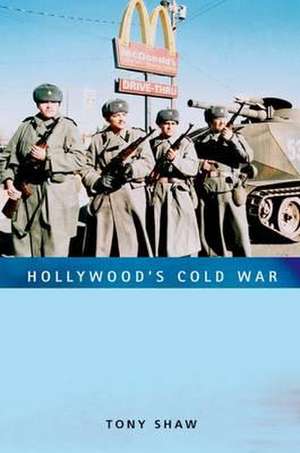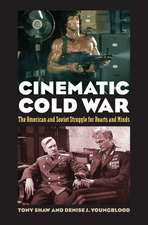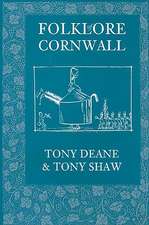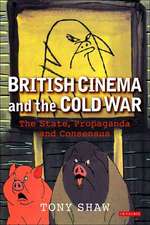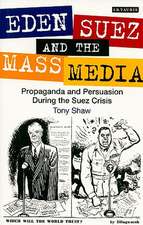Hollywood's Cold War
Autor Tony Shawen Limba Engleză Paperback – 19 sep 2007
| Toate formatele și edițiile | Preț | Express |
|---|---|---|
| Paperback (2) | 216.43 lei 22-36 zile | |
| EDINBURGH UNIVERSITY PRESS – 19 sep 2007 | 216.43 lei 22-36 zile | |
| University of Massachusetts Press – 24 oct 2007 | 298.22 lei 43-57 zile |
Preț: 216.43 lei
Preț vechi: 236.50 lei
-8% Nou
Puncte Express: 325
Preț estimativ în valută:
41.41€ • 43.36$ • 34.27£
41.41€ • 43.36$ • 34.27£
Carte disponibilă
Livrare economică 17-31 martie
Preluare comenzi: 021 569.72.76
Specificații
ISBN-13: 9780748625246
ISBN-10: 0748625240
Pagini: 352
Dimensiuni: 159 x 238 x 27 mm
Greutate: 0.61 kg
Editura: EDINBURGH UNIVERSITY PRESS
Locul publicării:United Kingdom
ISBN-10: 0748625240
Pagini: 352
Dimensiuni: 159 x 238 x 27 mm
Greutate: 0.61 kg
Editura: EDINBURGH UNIVERSITY PRESS
Locul publicării:United Kingdom
Recenzii
"Politically nuanced, historically contextualized, and internationally informed, Hollywood's Cold War is essential reading for anyone interested in this fascinating subject. Tony Shaw's analysis is both penetrating and comprehensive. The broad range of films he studies will greatly expand conventional understandings of the Cold War's impact on American filmmaking."—Christian G. Appy, author of Patriots: The Vietnam War Remembered from All Sides
"This is a complex and rewarding book held together with a coherent argument but not afraid to admit the many-sided possibilities when interpreting cultural products. . . . This is a fine, well-researched work."—H-Net Reviews
"A very broad and inclusive history of the interaction between U.S. films and the Cold War, covering the period from 1917 to 1989. Basing his narrative on extensive research, including archival materials, Shaw is objective and analytical in his approach. He deals with a wide variety of genres: documentaries, government, and Hollywood; the repressive atmosphere of the McCarthy era; the Vietnam War; the struggle for civil rights; and government subsidies. The U.S. position during the Cold War influenced and was influenced by Hollywood films. Presidents of both parties, bureaucrats, and security agencies, and military leaders used film to spread pro-American ideas and images, with mixed success. The book has extensive footnotes and an excellent bibliography. Important for political and cultural history. Highly recommended."—CHOICE
"A sprightly and very informative volume, which analyzes how Communists and their adversaries were shown on the big screen. Shaw also provides an often intriguing backstory in which particular forces and folks make the artifacts of mass culture that help shape perceptions . . . The extent of Shaw's research in official records and studio files, plus comprehensive trolling of the secondary sources, is bound to satisfy the most exacting standards, but in Hollywood's Cold War he wisely opts for case studies rather than synoptic breadth."—Journal of Cold War Studies
"[Shaw] makes a persuasive case. It is abetted by a levelheaded tone, a crisply informative manner, and an approach more concerned with telling a story than grinding an ax."—American Historical Review
"This book makes a significant contribution to the historiography of the Cold War. Shaw makes an excellent case that Cold War was fought culturally, as well as diplomatically, economically, and militarily. . . . It will prove indispensable to anyone considering further research and to those teaching courses on U.S. Cold War cinema."—The Historian
"Shaw meticulously researched book, Hollywood's Cold War, investigates the history of the mainstream American film industry's willing collusion with Washington to produce and disseminate anti-Communist entertainment nationally and internationally, while simultaneously marketing American capitalist ideologies to the world."—Screening the Past
"This is a complex and rewarding book held together with a coherent argument but not afraid to admit the many-sided possibilities when interpreting cultural products. . . . This is a fine, well-researched work."—H-Net Reviews
"A very broad and inclusive history of the interaction between U.S. films and the Cold War, covering the period from 1917 to 1989. Basing his narrative on extensive research, including archival materials, Shaw is objective and analytical in his approach. He deals with a wide variety of genres: documentaries, government, and Hollywood; the repressive atmosphere of the McCarthy era; the Vietnam War; the struggle for civil rights; and government subsidies. The U.S. position during the Cold War influenced and was influenced by Hollywood films. Presidents of both parties, bureaucrats, and security agencies, and military leaders used film to spread pro-American ideas and images, with mixed success. The book has extensive footnotes and an excellent bibliography. Important for political and cultural history. Highly recommended."—CHOICE
"A sprightly and very informative volume, which analyzes how Communists and their adversaries were shown on the big screen. Shaw also provides an often intriguing backstory in which particular forces and folks make the artifacts of mass culture that help shape perceptions . . . The extent of Shaw's research in official records and studio files, plus comprehensive trolling of the secondary sources, is bound to satisfy the most exacting standards, but in Hollywood's Cold War he wisely opts for case studies rather than synoptic breadth."—Journal of Cold War Studies
"[Shaw] makes a persuasive case. It is abetted by a levelheaded tone, a crisply informative manner, and an approach more concerned with telling a story than grinding an ax."—American Historical Review
"This book makes a significant contribution to the historiography of the Cold War. Shaw makes an excellent case that Cold War was fought culturally, as well as diplomatically, economically, and militarily. . . . It will prove indispensable to anyone considering further research and to those teaching courses on U.S. Cold War cinema."—The Historian
"Shaw meticulously researched book, Hollywood's Cold War, investigates the history of the mainstream American film industry's willing collusion with Washington to produce and disseminate anti-Communist entertainment nationally and internationally, while simultaneously marketing American capitalist ideologies to the world."—Screening the Past
Notă biografică
Tony Shaw is reader in international history at the University of Hertfordshire.
